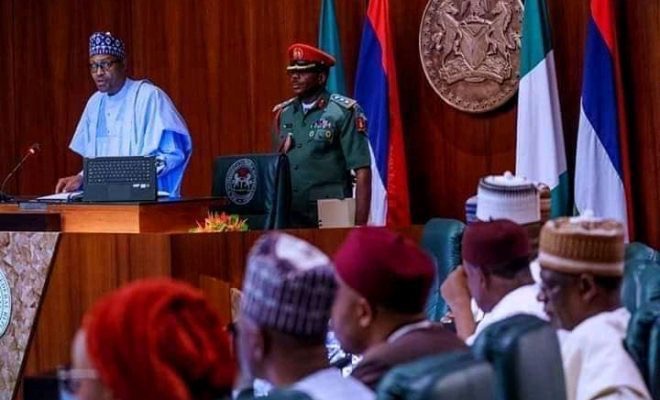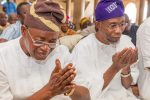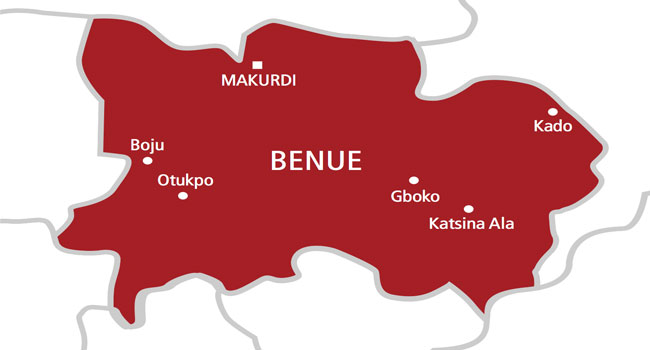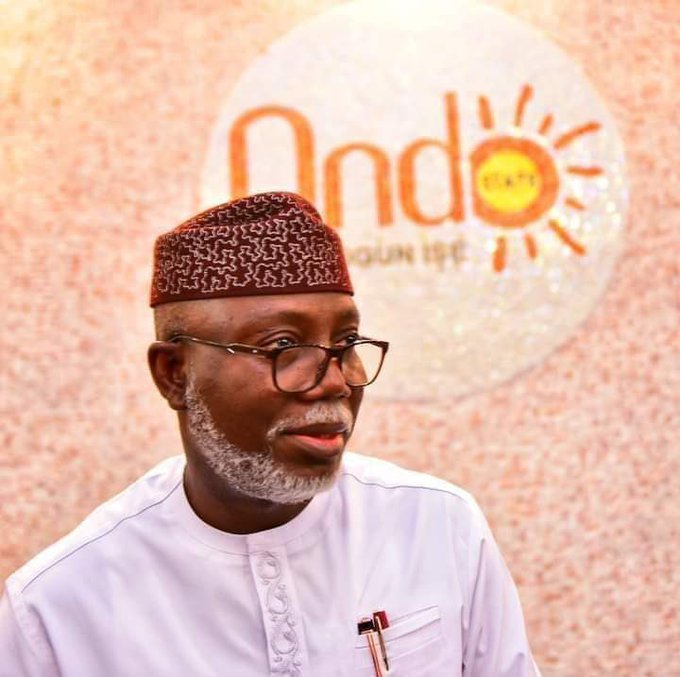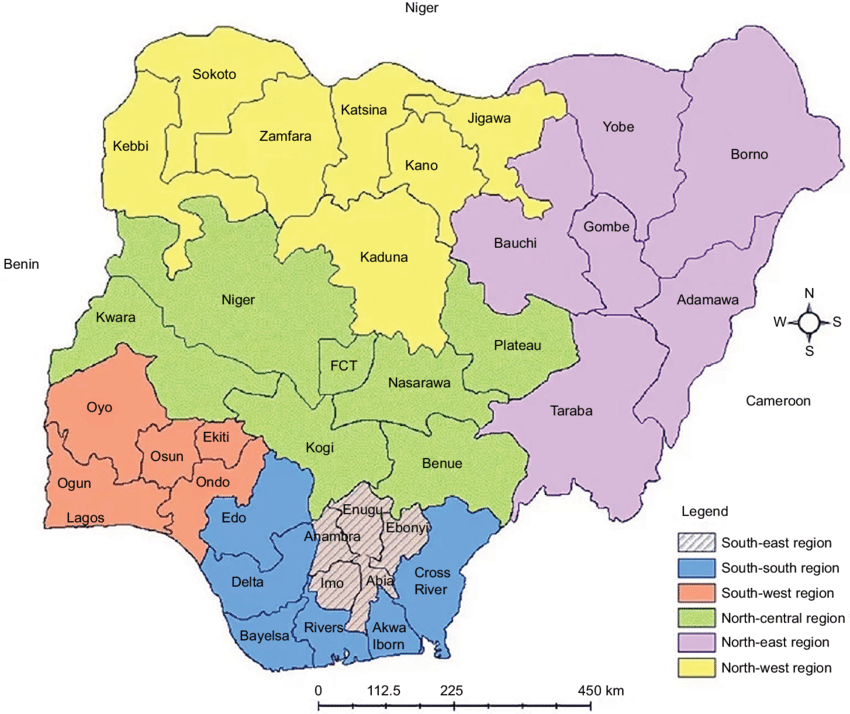When President Muhammadu Buhari, GCFR, inaugurated his cabinet on August 21, two burning issues were omitted in his speech. I am sure the issues must have been discussed at the Ministerial retreat organized by the office of Secretary to the government of the federation and the President felt it was no longer necessary to reopen discussions on the two issues during the cabinet inauguration.
The issues are relationship between Ministers and Ministers of state and relationship between Ministers and the National Assembly. Let us discuss the latter first.
Deep down in the heart of every Minister is how to cope with the insatiable demands of the members of the National Assembly especially the committee chairmen. And these demands keep increasing daily to the extent that Ministers prefer to send their Permanent Secretaries or top officials to the National Assembly. It is not only Ministers that are worried but heads of parastatals and agencies of the Federal Government. And because the members of the National Assembly have the powers to approve or disapprove the budget of the ministries, they now hold the ministers and heads of parastatals, hostage. The ministers are under severe and constant harassment.
Section 88 of the Constitution defines the powers of the legislature to investigate. It provides as follows: 88 (1) Subject to the provisions of this Constitution each House of the National Assembly shall have power by resolution published in its journal or in the Official Gazette of the Government of the Federation to direct or cause to be directed an investigation into: (a) any matter or thing with respect to which it has powers to make laws; and (b) the conduct of affairs of any person, authority, Ministry or government department charged or intended to be charged with the duty of or responsibility for—(i) executing or administering laws enacted by the National Assembly; disbursing or administering moneys appropriated or to be appropriated by the National Assembly.
(2) The powers conferred on the National Assembly under the provisions of this section are exercisable only for the purpose of enabling it to—(a) make laws with respect to any matter within its legislative competence and correct any defects in existing laws; and expose corruption, inefficiency or waste in the execution or administration of laws within it legislative competence and in the disbursement or administration of funds appropriated by it.”
Judging by actions of the members of the National Assembly in recent years, they have exceeded their boundaries and they now want to run the Ministries as if they are part of the executives like Ministers. They attend functions and events of various Ministries.
They want to be involved in employment and promotion of personnel in the various ministries and agencies. They also want to be involved in the execution of the various contracts in the ministries and agencies. In a short they want to be involved in the complete running of the ministries and agencies and there is no end to their demands. They have forgotten that their primary duty is to make laws and not to enforce the laws made.
I have read and reread Section 8 of the 1999 Constitution, I do not see absolute investigative powers given to the National Assembly. The former Attorney-General of the Federation, Chief Kanu Agabi, SAN, an accomplished lawyer of repute in a paper he presented in Jos of January 23, 2001, was worried about the abuse of power by the National Assembly.
He said “wide as these powers are, limits have been set to them by the Constitution limits which we appear to honour more in the breach than in the observance. Can the legislature order investigation of the executive or any of its parastatals? If it suspects, even on reasonable grounds, that an individual or organization is guilty of fraud can it order investigation of such an individual or organization? Can it, by motion o even by law, prohibit the payment of pensions or any other emoluments authorized to be paid by the Constitution to any person, however bad?
When, for any reason at all, the executive has ordered the removal of any of its members can the legislature compel the reinstatement of such persons? Can it command or order the Executive to institute action in court for enforcement of its rights whenever the legislature considers that those rights have been infringed? And if it is not satisfied with the conduct of the President can it pass a vote of no confidence on him?
Can it propose expenditure on its own initiative or must such proposal be sanctioned by government recommendation? Can it, on its own initiative, allocate funds to various government departments, agencies, projects and programmes or must it do so only on the basis of proposal put forward exclusively by the government? What remedies, are available to the legislature if in the event that the Executive withholds from it the machinery for enforcement of its decisions?
Can it investigate the past even when such investigation is not incidental to legislation or can it give directives to the government as to its future policies and programmes? These are the matters to which we seek answers. There can be no better place to go for answers to these questions than to the Constitution itself which is the source of the powers of the legislature.
The Legislature derives its authority from the Constitution. Its powers do not reside in the members but only in the Constitution. Those powers do not derive from expediency or discretion and do not depend on urgency or need. Only the Constitution is supreme.”
The Legislature has claimed for itself a monitoring or investigative role but in doing so it has exceeded the limit set by the Constitution. The Constitution has, indeed, conferred upon the legislature some investigative powers but only for a certain purpose. That purpose, given the functions of the legislature, can only be one incidental to legislation.
Against that background the question may be asked. To what end is the legislature empowered to investigate? The answer is obvious. To achieve the ends of legislation. It cannot, for instance, be to achieve the ends which the police strive to achieve when they conduct a criminal investigation or the ends of justice which a court strives to achieve when it conduct a trial.
If the legislature were to strive to achieve the ends of justice it would be taking upon itself the duties of a court. And if its objective were to prosecute, it would be taking upon itself the duties of the executive. As it is not permissible for the judges to legislate, so it is not permissible for the legislature to adjudicate.
And that is why the judges are compelled to enforce the law as it is and they are never allowed to inject into it their own notions of what it ought to be. The legislature must limit itself to the powers conferred upon it by the Constitution not withstanding that by exercising other powers not conferred upon it by law it can aid, facilitate or enhance the efficiency of the government.
The other issue is relationship between Ministers and Ministers of State. We are being told daily that there are no junior ministers. Even the constitution does not recognize junior ministers but in reality there are junior ministers. Appointment of Ministers of State was more pronounced during the civilian governments than during the military. Maybe because the civilians have a larger political constituency than the military.
Lets take for example the Minister of health and the minister of state for health. As at 2007, the following were the responsibilities of the minister of health— Principal Officer for the formulation and implementation of health policy and programmes. Other responsibilities of the Minister include—Ministry headquarters, all teaching and specialist hospitals (except those listed under HMS, National Agency for Food, Drug Administration and Control (NAFDAC), Federal Staff Hospitals, International Agencies, special projects such as HIV/AIDS, Onchocercariasis, Population Activities and Fund Agency (PAFA) and all memoranda to the Council of Ministers are initialed and presented by him.
The following also are the responsibilities of the Minister of State for Health. This include assist in formulation and implementation of health policy. Specific responsibilities of the office include Federal Medical Centres, Professional schools, Federal Staff Clinics in the states and any other duties that may be directed by the honourable Minister of Health.
The following teaching hospitals-University of Port-Harcourt teaching hospital, Port-Harcourt, Aminu Kano teaching hospital, Kano, University of Jos teaching hospital, Jos and University of Benin teaching hospital. His responsibilities also include that of Psychiatric hosptals at Useli(Benin), Sokoto and Yaba, Lagos. Others are National Eye Centre, Kaduna, Orthopaedic Hospital, Enugu, National Programme on Immmunisation, National Health Insurance Scheme and National Primary Health Care Development Agency.
From those responsibilities one could judge who is a junior minister. Appointment of Ministers of State can be traced to the first republic and the first Minister of State appointed in this country is a Camerounian, that was when Cameroun was still part of Nigeria. He is Chief Victor Mfon Esemingsongo Mukete from Kumba in the present Cameroun. He is currently a Senator in Cameroun.
Chief Mukete served as a Minster of State in Nigeria in 1957. Also appointed Minster of State was Chief Moses Aransiola Onilearan Olanrenwaju (1916-1968) of the Northern Peoples Congress (NPC). He was from Omu-Aran in Irepodun local government area of Kwara state. He was the Sarkin Dagi of Ilorin and Obanla of Omu Aran. Before joining politics he was a forest ranger. In the 1959 general election, Chief Olanrewaju defeated J.I.T. Abaoche of the Action Group by 9,238 votes to 6,672 votes. In the election, Chief M.A. Ojo, an independent candidate had 922votes while Lasisi Ojomo of NCNC had 597votes. Omu Aran had produced prominent leaders including the pioneer governor of Kwara, Brigadier General David Lasisi Bamigboye, the former governor of Bauchi and Osun states, Colonel Theophilus Bamigboye, Bishop David Oyedepo of The Living Faith Church World Wide, Most Reverend S.A. Abidoye, 5th spiritual father of Cherubim and Seraphim, Reverend James Jide Ayanda- renowned banker and founder of Mount Horeb International Church with headquarters in London, Sir Adeboye O. Ropo-General Coordinator, OMU-ARAN PEOPLES MOVEMENT(OPM), the Afolayans of Nollywood, Chief Suleiman Owolewa, Dr. Ade Oladipo, Alhaji Olawuyi Ajulopin, Alhaji Abolarinwa Tejumola and others.
In 1958, the late Ooni of Ife, Oba Titus Martins Adesoji Tadeniawo Aderemi (1889-1980) was minister without portfolio, Dr E.A. Esin also served as Minister of State in the Ministry of Foreign Affairs and Commonwealth Relations. The first Minister of Defence, Alhaji Muhammadu Ribadu had two Ministers of State under him, Honourable J.C. Obande and Chief Matthew Tawo Mbu (1920-2012).
While Chief Obande was in charge of the Army, Chief Mbu was in charge of the Navy. Chief Obande was later replaced with Alhaji Ibrahim Tanko Galadima. It was Alhaji Tanko Galadima who encouraged the likes of General Ibrahim Babangida, General Abdusalam Abubakar, General Mamman Vatsa and others to join the Nigeria Army. In September 1964, Chief Ayo Rosiji of the NNDP-Nigerian National Democratic Party (Egba east) and Chief Adisa Akinloye (Ibadan) were made Ministers of State. On January 7, 1965, the then Prime Minister, Sir Abubakar Tafawa Balewa appointed the following as Ministers of State—Alhaji Nuhu Bamali (NNA), Alhaji Usman Maitambari (NNA), Alhaji Hashim Adaji (NNA) and Alhaji Ibrahim Tako (NNA).
Even in the regions at that time traditional rulers were appointed as Commissioners without portfolio. On June 4 1962, the administrator of Western Region at that time, Dr. Moses Adekoyejo Makekodunmi (1916-2012) appointed six traditional rulers to assist and advise him on the day to day running of the affairs of the region. They included Oba of Benin, Akenzua II, Oba Uku Akpolokpolo Omo n’Oba n’Edo (1899-1978), the Awujale of Ijebuland, Oba Sikiru Kayode Adetona (85), Ogbagba II, the Osemawe of Ondo kingdom, Oba Rufus Adesokeji Aderele Tewogboye II, the Olubadan of Ibadan, Oba Isaac Akinyele, (1880-1965), the Olu of Warri, Oba Erejuwa II A.K.A. Wilson Ayoronmitsi Gbesimi Emiko who reigned between 1951-1986 and the Olu of Iwo, Oba Samuel Omotosho Abimbola, who reigned from 1958 to 1982.
During the interim government under Chief Ernest Adegunle Oladeinde Shonekan (83) in January 1993, the following were appointed as Ministers of State. They are Alhaji Isa Mohammed (Agriculture), Alhaji Bello Dogondaji (Commerce and Tourism), Alhaji Umaru Baba(Defence), Professor Ben Nwabueze(Education and Youth Development), Alhaji Saidu Isa(Foreign Affairs), Dr.(Mrs) Laraba Daggash(Health and Human Services), Alhaji Oladuni Ayandipo(Power, Mines and Steel), Mrs Emily Imoukhuede (States and Local Government Affairs) and Yusufu Galadima (Transport and Communications).
In the first term of President Olusegun Obasanjo in 1999, he appointed twenty-two Ministers of State. They are Alhaji Musa Elayo Abdullahi (Justice), Chief Chris Agbobu (Agriculture), Alhaji L. Ade Haruna-Elewi (Communications), Mallam L. Tukur Batagarawa (Defence, Army), Mrs. Modupe Adelaja (Defence, Navy), Engr. Dan Chuke(Defence, Airforce), Alhaji Bello Usman (Education), Dr. Imeh T. Okopido (Environment), Mr. Solomon S.A. Ewuga(Federal Capital Territory), Senator Jubril Martins-Kuye (Finance), Chief Dubem Onyia(Foreign Affairs), Dr.(Mrs.) Aminat Ndalolo (Health), Chief Lawrence Nwuruku (Industry), Dr. Mohammed Shata (Internal Affairs), Alhaji Danjuma Goje(Power and Steel), Mrs. Pauline K. Tallen(Science and Technology), Mr. Isa Yuguda(Tranport), Chief Precious Ngelale(JP) (Water Resources), Mr. Garba Madaki Ali(Transport), Mr. Yomi Edu(Special Duties, The Presidency), Prince Vincent Ogbulafor (Economic Matters, The Presidency) and Alhaji Ibrahim Umar Kida(Inter-Governmental Affairs, The Presidency)
There have always been conflicts between Ministers and Ministers of State and there will always be especially when they have one Permanent Secretary. This issue was treated at the 4th retreat for Ministers and Permanent Secretaries between 23rd-25th September, 2001 at the National Institute for Policy and Strategic Studies, Kuru, Jos. It was organized as usual by the office of the Secretary of the Government of the Federation. I attended the retreat.
In a paper presented by the then Permanent Secretary, Political Affairs, office of the Secretary to the government of the federation, Dr. Hakeem Baba Ahmed, he pleaded for restraint among Ministers and Ministers of state. In the paper, he said, “Ministers must acquaint themselves thoroughly with the rules, regulations and objectives of the public service as an institutions including its strengths and weaknesses; educate and sensitise the top echelons of the service on the essentials of their mandate, including general and specific goals; demonstrate the highest standards of personal and official integrity, competence and leadership qualities in dealing with all levels of civil servants; cultivate an environment which accords respect for the civil servants, his profession, and concern for his welfare and the security of his job.
Conversely, the Ministers need to ensure they do not operate, or seek to achieve goals and targets outside the established framework of the Public Service, or to do so through a selective approach to conformity with rules and regulations, or by showing ignorance and/ or contempt of the service, or isolate the top echelons of the Civil Service from a full appreciation and understanding of the demands of their political mandate, as well as the collective goals of the leadership; compromise, in personal or official conduct, the extremely high moral and ethical standards of the present leadership, or show incompetence in managing the demands of their offices, or disrespect for fair play and justice in their relations with civil servants and demonstrate contempt or disrespect for civil servants, their professionalism, welfare or security”.
In a communique issued at the end of the retreat it was adopted that both Ministers and Minsters of State must work together as a team. They both need each other.

